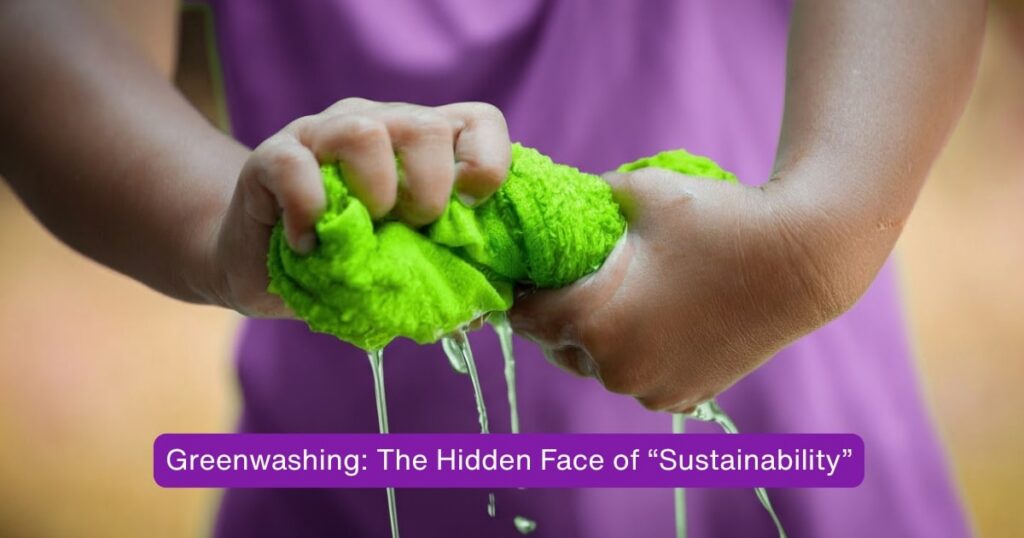
In the current climate, marketing products as “sustainable” is more attractive than ever. More than ever, consumers are paying attention to the social and environmental consequences of their purchases. Clothing brands marketing goods as ‘eco-friendly’ and companies claiming ‘carbon neutrality’ have become the market norm. Despite the increasing popularity of ‘eco-conscious’ products, there are still more concerning issues within the market, namely, the phenomenon of ‘greenwashing’.
Most simply, ‘greenwashing’ is the practice of falsely marketing products and services as ‘environmentally friendly’ and ‘eco-conscious’ when they are not. It is simply another way for companies to reap the economic benefits of the sustainable marketing trend without actually implementing any necessary changes to their sustainability practices. This is an essential concept to understand in the field of Corporate Social Responsibility (CSR), which is why it receives strong emphasis in our CSR course.
What Does Greenwashing Look Like?
Greenwashing can take many forms, some obvious and others subtle:
- False Promotions: “Eco-friendly,” “all-natural,” and “clean” are labels often used and abused on packaging without any proof or certification.
- Hidden Trade-Offs: A product may emphasize one “green” attribute and suppress other damaging practices. For example, recyclable and “clean” packaging that is made with toxic chemicals.
- Irrelevant Claims: A business will associate themselves with something that is legally mandated, like “CFC-free” aerosols, which have been banned for decades.
- Misleading Imagery: Green leaves, earthy tones, or pictures of nature can trick consumers into associating a brand with sustainability even when no real effort exists.
Why Is Greenwashing a Problem?
While greenwashing can be considered an exaggerated marketing strategy with no apparent ramifications, in reality, its consequences are far more severe.
- Consumer Deception: Conscious consumers who are interested in what they purchase end up supporting these firms which are not aligned with their interests and values.
- Unfair Competition: Organisations that focus on sustainable projects are likely to be outperformed by these businesses whose only focus is to masquerade as environmentalists.
- Slowed Progress: It diverts attention and resources away from genuine solutions to climate change and environmental degradation.
- Erosion of Trust: Long term consumers are likely to become sceptical of all claims of sustainability of those businesses that incorporate practices that create a positive change.
This is why a structured CSR course is essential — it provides tools to recognize, challenge, and prevent greenwashing, while promoting authentic, responsible business practices.
How to Spot and Avoid Greenwashing
Consumers are not powerless. By being more discerning, you can reduce the chances of being misled:
- Look for Certifications: Logos like Fair Trade, Energy Star, or FSC (Forest Stewardship Council) do carry more weight than unsupported assertions.
- Read the Fine Print: Determine whether the company substantiates and details its sustainability claims.
- Research the Company: Numerous independent assessments, news, and watchdog reports can be helpful in combing through the facts as opposed to the marketing strategies.
- Be Sceptical of Perfection: True sustainability is multi-faceted. If a company claims to be 100% green without explaining how, that’s a red flag.
Moving Forward: Demanding Accountability
The fight against greenwashing is not just a consumer responsibility. Stronger guidelines and penalties need to be introduced by Governments and regulators. The EU, for example, is seeking to regulate imprecise environmental advertising. Meanwhile, activists and NGOs continue to push for transparency and accountability.
At the same time, consumers should support genuine businesses and reward them. It makes the whole industry more competitive and encourages more businesses to adopt sustainable measures.
Conclusion
Greenwashing thrives on consumer goodwill and a lack of scrutiny. But once we understand its mechanisms, we can begin to dismantle it. Real sustainability requires honesty, transparency, and sustained commitment – not just clever marketing campaigns. The next time you see a product claiming to be “green,” take a closer look.
Gaining the ability to identify these practices and help companies implement real ethical change begins with enrolling in a CSR course. The next time you see a product claiming to be “green,” take a closer look.

Leave a Reply